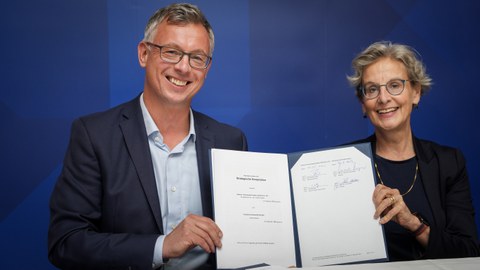May 31, 2023
Infineon Dresden and TU Dresden Enter Strategic Cooperation Agreement

from left: Raik Brettschneider (Vice President & Managing Director of Infineon Dresden) and Prof. Ursula M. Staudinger (Rector of TUD)
Infineon Technologies Dresden GmbH & Co. KG and Dresden University of Technology (TUD) have entered a strategic cooperation agreement, further expanding their long-standing collaboration.
By placing their signatures on the agreement at a ceremony being held today, Raik Brettschneider, Vice President & Managing Director of Infineon Dresden, Thomas May, Senior Director Procurement of Infineon Dresden, Prof. Ursula M. Staudinger, Rector of TUD and Jan Gerken, Chancellor of TUD, will pave the way for a lasting, trusting, equitable and comprehensive strategic partnership in research, teaching, innovation, continuing education, internationalization, recruiting and university marketing, and promote social dialog surrounding technological developments. The close cooperation strives to promote and strengthen the positions of both partner organizations in the long term, both domestically and internationally.
“By reinforcing our collaboration with Infineon, we see an opportunity to increase the visibility of nanoelectronics and microelectronics research as well as semiconductor production in the region amongst school pupils and graduates in Germany and beyond,” underscores Prof. Ursula M. Staudinger, Rector of TUD. “As a University of Excellence with a strong emphasis on research and particularly powerful innovative strength – as reaffirmed by the latest rankings – we are in an outstanding position to provide inspiration for the research and development of the next generation of semiconductors through this cooperation.”
“We have already had the pleasure of working closely with TU Dresden for many years. By signing the new strategic cooperation agreement, we seek to broaden this collaboration,” comments Raik Brettschneider. “The global need for semiconductors will only continue to grow rapidly and steadily due to the demand for renewable energy technologies, data processing centers and e-mobility. Microelectronics technology from Infineon substantially help us to meet two key challenges in our society: decarbonization and digitalization. With the construction of the new Smart Power Fab, Dresden will take on a pivotal role. When it comes to projects for researching, developing and manufacturing semiconductors, we want to work even more closely with TU Dresden. This will also bolster the competitive position of the largest microelectronics cluster in Europe – Silicon Saxony.”
Infineon has already begun expanding its production capacity in Dresden. The group has invested EUR 5 billion in the Smart Power Fab, which will enable the flexible production of two distinct semiconductor technologies: power electronics for low-loss electricity circuitry and analog/mixed-signal chips. Analog/mixed-signal components are used in electricity supply systems such as those integrated into energy-efficient chargers, in small engine control systems in vehicles, in data processing centers and in Internet of Things applications. The interplay of power semiconductors and analog/mixed-signal components makes particularly energy-efficient and intelligent system solutions possible.
Specifically, the strategic cooperation agreement between Infineon Dresden and TUD makes provisions for bilateral R&D jobs and collaborations. It also seeks to strengthen cooperation in teaching, for instance through the expansion of joint teaching arrangements. A proven example is the Dresden Microelectronics Academy, which has already been hosted several times at TUD with the support of Infineon Dresden.
“Just as important is the transfer of innovation and technology from the university to industry,” says Prof. Ronald Tetzlaff, Chief Officer Technology Transfer and Internationalization at TUD. “This cooperation will enable close collaboration in both research and in education. When science and industry successfully join forces, everybody wins. Scientific findings can be fed into industry more directly and thus be transfered to application more efficiently. Moreover, students can benefit from real-world knowledge.”
The cooperative agreement is laid out for an initial next five-year period and it also comprises recruiting, university marketing, and the joint shaping of social dialog about technological developments. One core focus will be on current advancements in artificial intelligence – from both a technical and an ethical perspective.
Information on the partners
Infineon Technologies Dresden GmbH & Co. KG is a subsidiary of Infineon Technologies AG. With approximately 3,300 employees, it is one of the group’s largest development and production locations. Infineon is a worldwide leading provider of semiconductor solutions for power systems and the Internet of Things. With its various products and solutions, Infineon is a driver of decarbonization and digitalization. The company boasts a staff of around 56,200 worldwide and reported revenue of approximately EUR 14.2 billion for the 2022 fiscal year (ending September 30).
Dresden University of Technology (TUD), as a University of Excellence, is one of the leading and most dynamic research institutions in the country. With around 8,300 members of staff and more than 30,000 students, it is one of Europe’s largest research and teaching institutions in the natural sciences and engineering. Founded in 1828, it has grown to become a globally oriented, regionally anchored top university that aims to make innovative contributions to solving global challenges. Its research and teaching successfully marry engineering and natural sciences with the humanities, social sciences and medicine. This wide range of disciplines is an outstanding feature that facilitates interdisciplinarity and transfer of science to society.
Media inquiries:
TU Dresden
Press Office
Tel.: +49 351 463-32398
https://tu-dresden.de
Infineon Dresden
Christoph Schumacher
Director Communications
Tel.: +49 351 8861100
